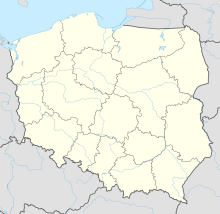Buderose Castle
Coordinates: 51 ° 59 ′ 55 ″ N , 14 ° 43 ′ 25 ″ E
Buderose Castle was the main building of a manor on the southern outskirts of the village of Buderose, today Budoradz in Poland in the rural community of Gubin , in the parish of Groß Breesen.
history
Buderose Castle near Guben was built in 1637 on the manor of Friedrich von Pilgram auf Wallwitz, which had existed as a Bohemian fief since 1527, on the right bank of the Neisse . In 1786 the captain Franz August von Blücher bought the property, which remained in the possession of the Blücher family until 1878. By marriage, it then belonged to the Studnitz family until Paul von Studnitz sold it to his brother-in-law, the Africa traveler Emil Kräusel, at the beginning of the 20th century (1903). In 1924 the castle was transferred to the town of Guben, which left it to the "Comradeship of Front Poets in the NSDAP " as part of a foundation . In this way there were means of maintaining the property through the Prussian provincial administration. After the Second World War, the building fell into disrepair, with the exception of the cellar. A farm building and the pillars of the gate entrance remained.
Use during the time of National Socialism
During the Nazi era, Buderose became the "House of German Front Poets" under the direction of Jürgen Hahn-Butry . On June 13 and 14, 1938, the first Reich front poet meeting of the "team" took place in Guben and the village of Buderose in the presence of the Reich leader of the NSDAP, Alfred Rosenberg. The numerous writers present included Edwin Erich Dwinger , Mario Heil de Brentani , Max Barthel , Rudolf G. Binding and Hans Friedrich Blunck .
In March 1939, the Rosenberg Office's first philosophical workshop took place under the direction of Alfred Rosenberg and Alfred Baeumler . According to a report by the Völkischer Beobachter , the aim was to determine “how far independent approaches to philosophizing from a National Socialist attitude can be noticed among the young academics who come from the direct experience of National Socialism.” a. Joachim Ritter , Eduard Baumgarten , Johannes Hoffmeister , Bruno Liebrucks , Erwin Metzke , Karl Schlechta , Heinrich Springmeyer .
literature
- Jörg Plath: "House of German Front Poets" in Buderose near Guben. In: Peter Walther (Ed.): The Third Front. Literature in Brandenburg 1930–1950. Lukas, Berlin 2004, ISBN 3-936872-25-2 , pp. 33-44.
- Federal Archives, Finding aid: Kanzelei Rosenberg, NS 8/151, HK ( Foundation "House of German Front Poets", Buderose Castle near Guben (filed under H), 1938).
- Federal Archives, Finding aid: The Führer’s representative for the supervision of the entire intellectual and ideological training and education of the NSDAP, NS 15/312 ( holding a philosophical workshop at Buderose Castle near Guben, preparation of another conference at the Vomperberg Gau training castle near Innsbruck ).
- First Reich front poet meeting of the "team". Published by the "team", comradeship of the front poets in the NSDAP, Berlin o. J. (1938) (Brochure in the files of the Brandenburg Provincial Association, Dept. XI, cultural department, literature archive in the LHA Potsdam)
Web links
- Front Dichterheim Buderose on Literaturport.de
- TK25 sheet 3954 Wellmitz - edition 1946 , the property is registered on the lower edge of the card.
Individual evidence
- ↑ quoted from George Leaman: Deutsche Philosophen und das "Amt Rosenberg". In: Ilse Korotin (ed.): "The best spirits of the nation". Philosophy and National Socialism. Picus-Verlag, Vienna 1994, ISBN 3-85452-257-6 , pp. 41-65.
- ↑ Hans Jörg Sandkühler : "A Long Odyssey" - Joachim Ritter, Ernst Cassirer and the philosophy in the 'Third Reich' ( Memento from September 19, 2011 in the Internet Archive ) (PDF; 268 kB), 30
- ↑ Information according to Muses and Graces in the marrow. 750 years of literature in Brandenburg. Volume 2: Peter Walther: A historical writer lexicon. Lukas, Berlin 2002, ISBN 3-931836-69-X , p. 55.
